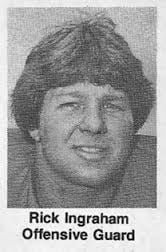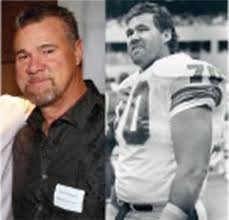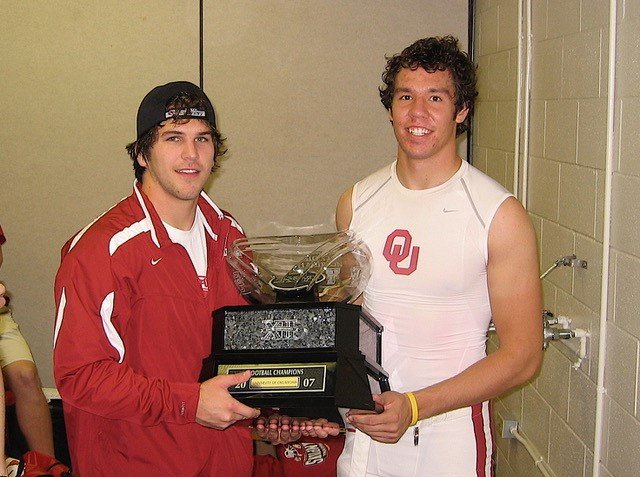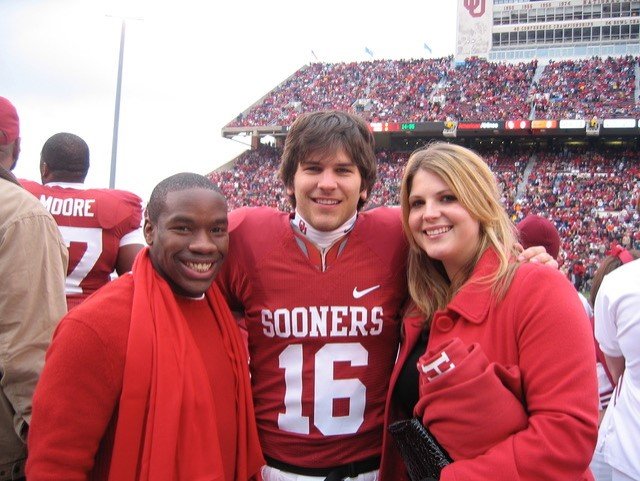Randy and Jenna at Hall of Honor installation
In 2021 Jenna received the second most TLSN national listeners of 22 oral history productions produced in two years. Her link is https://texas-lsn.squarespace.com/jenna-mceachern
THE TLSN INTERVIEW: RANDY McEACHERN
TLSN: You --- and teammates from the signing class of '74, such as Earl Campbell and Brad Shearer -- had been freshmen when Coach Fred Akers was on Darrell Royal's staff before he went to Wyoming as head coach for two years. And you had missed the miserable 5-5-1 '76 with a knee injury, right when you had a chance to compete for the quarterback job with All-America wishbone QB Marty Akins departed.
But Akers and his staff moved you to defensive back in the spring of '77. How hard was it to stand up for yourself and stay in the QB mix?
RANDY: Not very hard, actually. I wasn’t scared. Nervous, probably, but not scared. I hadn’t played defense since I played Pop Warner, so to me, that would have been a waste of time. When they moved me, I was sick to my stomach, horribly disappointed because I was just lost over there. It felt as if they were throwing me away.
That’s when I went to Coach Akers and said,"I think I’m as good as any quarterback as you have.” All I wanted was a shot. He said, “Well, you need to make your arm stronger,” so I spent the whole summer throwing to Ronnie Miksch and whoever would catch the ball for me. When I went back in the fall, I was listed as the fourth string quarterback. I wish I had the chance to ask Akers why he moved me back to QB.
TLSN: When Texas started the '77 season with three blowout wins, you got some playing time behind Mark McBath and Jon Aune. Two-parter here....What was your mindset about your future as the team prepared for OU....and...as it turned out, how much did the snaps in those games prepare you for becoming QB-1 ?
RANDY: I got about two minutes playing time in each game, which you know is just clean up. We weren’t throwing it at the end of the blowouts. The week before we played OU was our bye week. I was at my parents' house in Pasadena, and we watched OU play Ohio state. OU kicked a last-minute field goal to win the game. That night I dreamed I got into the OU game, and for the first time in six years, we won. I told my family at the breakfast table and everyone laughed about it.
My dad coached high school, so he couldn’t come to the game. It wasn’t televised nationally, so my parents couldn’t watch it. They listened to it on the radio. When I went into the game, friends started calling my parents’ house, and my dad wrote on the front of a sheet of notebook paper “Randy’s Dream…” and recorded the names of everyone who called them during the game. After we’d won, Dad wrote, “Comes True” at the bottom of the page. We still have that piece of paper today.
This is funny. Jenna had been trying to find a tape of that game for years. The game film had gone missing from the athletic department. She couldn’t find it on the internet. She even called OU to ask for their game film, but all they sent her was OU’s offensive film. She finally gave up trying to find it.
When (Randy and Jenna's son) Hays was a freshman at Oklahoma, Randy Riggs of the Statesman interviewed him and asked if he’d ever seen the 1977 Texas vs. OU game. Hays replied, “No, my mom’s tried to find it for years and it doesn’t seem to exist.”
A week or so later—this was October--an elderly gentleman knocked on our front door, and he was holding a Beta Max tape of that game. Jenna kept it a secret from me, but she had DVDs made of the film, one for each of our kids, one for my dad, and one to give me for Christmas. When she gave Hays his copy, she’d attached a note which said, “Watch this and you’ll see I’m telling the truth…you are a better quarterback than your father was.”
I had copies made and gave them to my teammates at our 30th reunion.
TLSN: That's awesome. I want one! Yeah, now I remember that they just did a telecast for maybe Austin and Norman. My ol' buddy, Steve Ross, was doing the UT color for that cast. I'm glad I had a front row seat on the sidelines. When McBath went out and Aune went down, twice....the second time to put him out for the year...what were the coaches saying to you between possessions?
RANDY: After Jon went down the first time, they were talking to me about being ready to go in. Then, Jon went right back in, and they thought he’d be able to finish. After he fell for the second time, there was no time for talk. Coach Akers called me over and asked, "Are you ready?” I told him, “Coach, I’ve been ready or this my whole life."
During the week of the game, Coach Akers and the other coaches discussed whether they should take a third quarterback or a third center. Akers won that argument, and that’s how I was on the sideline.
TLSN: The fates. That's wild. I mean, Texas took four QB's to Lubbock for the game last month.I know you've answered this a thousand times, Randy, but it's worth going over again. You're suddenly in charge, right in the middle of a typical Texas-OU cagefight. What was it like commanding the huddle in that atmosphere? It was a young team --- mostly sophomores, particularly on defense -- but you had Earl and linemen Rick Ingraham, David Studdard and George James as classmates. How much, if any, encouragement did you receive from those guys or others?
RANDY: I was timid in the huddle at first, talking to guys who’d been playing the whole time, even though many of them were my classmates. Someone - I don’t remember who said it - said, “You gotta speak up.” As the game went on, I grew more confident. I got lots of encouragement from the team. George James met me halfway to the huddle and said, “Randy, you can do this.”
So, I did get a lot of support from them, but all I was thinking about was calling the play, executing, etc.
TLSN: How much trashtalking were the Sooners giving you? Anything we can print here?
RANDY: A lot. (George) Cumby and (Daryl) Hunt were the two linebackers, and when they had me down on the ground, they were growling all kinds of obscenities at me. I may or may not have thrown one back at them.
TLSN: I remember a joyous madhouse once they let the media into the locker room at the Cotton Bowl. And I recall having to fight off hordes of reporters to finally get you on the live KVET locker room show, knowing I would get fired after just two months on the job if I didn't land the biggest interview of the year. None of us had bothered to interview you in September and now every writer and broadcaster was on you, like flies on a ribroast. What do you remember thinking to yourself as the team victoriously returned to Austin?
RANDY: As soon as the game was over, (Houston radio legend) Barry Warner stuck the mic in my face. I remember thinking, “What just happened?” I was numb, but grateful that God had put me there, let me get through the game and perform. Governor (Dolph) Briscoe came into the locker room. My former girlfriend was friends with his daughter and she sent a note in to the locker room to congratulate me. The locker room was crazy, full of people. I was one of the last people out of the locker room. You live in that moment of glory, but come Sunday, we’re studying for the Arkansas game. OU was number 2 when we beat them, now we were going to face number 8 Arkansas. Suddenly, there’s more pressure on me because now I’m the starter.
One of my favorite pictures of all time was taken as we were leaving the locker room at the Cotton Bowl.
(WR) Ronnie Miksch, (LB) Mark Hamilton, and me. They were my two best friends on the team. I’m in the middle, they’ve got their arms slung over my shoulders, and we’re all grinning.
Mark Hamilton, Randy, Ronnie Miksch after Texas beat OU
TLSN: Now you had a short practice week before a Friday flight to the Ozarks for your first start: Second-ranked Texas against 8th-ranked Arkansas. I'm sure it was and is a blur. Does anything stand out in the memory files for those days leading up to the game?
RANDY: My best high school friend, who played quarterback in front of me at Dobie, played on the defensive side for Arkansas. He called me one night and told me that my old coach, who now coached at Arkansas, had said,” Don’t worry about that guy [McEachern]. He throws like a three-fingered clown.” He came into the Texas locker room after the game ( UT won, scoring the only TD of the game ) and I sure enjoyed seeing him. I shook his hand with three fingers.
Once again, Alfred saved the day. I had to throw a pass into the wind, he jumped up, just made an incredible catch and kept the drive alive. We ran a double reverse which set up a screen pass to Earl. The linebacker was right there; all he had to do was grab Earl, but it’s like he froze. Earl caught the pass and took it down to the one. We ended up winning 13-9.
The clock was winding down, and everyone in the huddle was starting to celebrate. Alfred Jackson tells the story that at one point, everyone in the huddle was talking at once and I hollered, "Shut up! No one talks in the huddle except for me.” Alfred laughed and said, “Who do you think you are?"
TLSN: The whole thing -- your emergence, Earl on a rampage, the defense killing it -- made the Longhorn football team the most compelling story in college football. I've never known you NOT to be honest, Randy....you always were great with me while I bothered you at every practice and game for two seasons...but be honest: Did you allow yourself a little "look at me now" feeling? Don't tell me people weren't treating you differently in classes, around campus, in restaurants and nightspots and in the locker room. People dream about a triumphant rise like yours. So -- in less than two thousand words -- what the heck was it like?
RANDY: Wow. You’re right. The year before, my picture wasn’t even in the media guide. Then, overnight I’m a star. I never take credit for that. I always say, “Oh, all I had to do is hand off to Earl.” I know that’s not true, but it is humbling the way things happened.
Was I treated differently after the OU game? You bet. As you were saying, suddenly, I was talking to reporters when I’d never had to do that before. People wanted me for speaking engagements, wanted my autograph. I met alums I probably never would have met. Got letters from all around the country. Girls would bring chocolate chip cookies to the dorm. And I enjoyed it all. Who wouldn’t? That’s why you come to Texas…to hope to get a chance to play with the best.
The year before I’d had that awful knee surgery. Coach Royal came to visit me in the hospital and said, “Randy, it looks pretty bad, but don’t worry, your scholarship is safe. Just concentrate on your studies.” Everyone thought I was through.
So, yeah, the success was sweet. It proved something to me, which was that I was good enough to play at Texas. And of course, I did end up marrying the cheerleader.
TLSN: Yep, the man who got it all. You were listed at 5-11 and 175, the same as James Street was listed about a decade earlier. James was nowhere near that big. What was the reality for people who called you small?
RANDY: At my heaviest, I was 180, but I’d lose five pounds during each game. So, I was 5’11, 175-80. Robert Heard (writer and author of "Oklahoma vs Texas: When Football Becomes War") described me as a “whippet." Still pisses me off.
TLSN: Well, this is probably worse than "whippet." I remember that the internal public address guy in the press box for the U of H game, which was at Rice Stadium for '77, seemed to deliberately mispronounce your name on each play as "McUrchin." Unbelievably bush league.
You and the Horns rolled on that day, beating the defending SWC champs, 35-21....you survived another knee flare-up and sat out the TCU game but UT steamrolled on to 10-0 approaching the game against A&M. Did you ever feel that some people were short-changing you on your football IQ and skills, acting as if you were a male Cinderella who got powdered with a truckload of magic pixie dust of good fortune?
RANDY: Of course. The “Cinderella" story is cute, but it says that I was just lucky, and the fact that I had Earl, anybody could have done it. But I did hit key passes on key drives in key games that made the difference. I was blessed to have a great cast, but did I help? Absolutely.
TLSN: You threw four touchdown passes in a 57-28 butt-kicking of the Aggies in College Station, and Earl essentially wrapped up the Heisman. What stands out from that day, that game, when you look back?
RANDY: Beating the Aggies at Kyle Field is always satisfying. Beating the snot out of them is priceless. That sewed up the conference championship, of course. Earl’s catch is a great story. We practiced with him all week because the pros didn’t think he could catch. He’d catch it half the time in practice, the other half, he dropped it. We ran that play in the game, and it was set up perfectly. Earl was wide open on the sideline, and he says when he looked at me, my eyes were big as saucers. It was about a 30 yard pass, he caught it, and ran 30 more for a touch.
Alfred made two unbelievable catches. Alfred used to say that I’m the reason he made it to the pros. He claims the scouts said, “If you can catch McEachern’s passes, you can catch anything."
And to tie the great Clyde Littlefield’s record of four touchdown passes was very cool.
TLSN: The Notre Dame game in the Cotton Bowl turned into kind of a nightmare. Nothing went well. Coach Akers just seemed stunned when we in the media talked to him afterwards. He asked us, "You ever had a bad day?" Then he answered himself and said, "We had a bad day, man." That kind of summed it up.
Any impressions now from that outing? I remember that you were one of the only guys who would talk on the locker room show.
RANDY: After beating the Aggies then taking off a month, it’s awfully hard to maintain momentum. I do believe the underdogs have the advantage in a situation like that. The week before playing Notre Dame, Akers was out. His brother and nephew, I believe, were killed in a car wreck. (Coach) Bobby Warmack ran everything that week, and we didn’t see Akers until game time. Our middle linebacker, Lance Taylor, was out, and we really missed him. Lam Jones pulled a hamstring catching a pass. Fumbles, interceptions, we changed the game plan halfway through, and we just couldn’t recover. They were a big team. I hate to remember that game, but then, a lot of teams have lost to Joe Montana.
(Jenna interjects this: "Bear Bryant always said that, if one poll voted a team national champions, they could claim to be # 1. In 1977, 4 polls voted Texas # 1. Five polls voted Texas # 1 in 1970. Thus, Randy’s bust should have been right between Eddie’s and Vince’s (when busts of the national championship teams were unveiled the day before Texas-Bama)."
TLSN: The 1978 season, with you coming back as a veteran fifth-year guy, was mostly good. Plenty of highlights, for you -- especially that memorable win over number three Arkansas in Austin -- and for the Longhorns, in a nine-win season. But you took some heat, in spite of the loss of Earl to the Oilers, whenever the offense sputtered. And there were people wanting to see Donnie Little, the freshman speedster and number one recruit, get in at quarterback. You went from the "feel good story" to the "okay, move on, kid" guy in the eyes of some fair-weather fans after Texas lost to OU (and Heisman winner Billy Sims) and to Houston in a defensive slugfest. How much did that affect the fun of playing football for Texas?
RANDY: I knew I was being replaced, but I had had another knee surgery at the end of the 1977 season, and after that, I just never was as fast as I had been, never had the confidence in my knee that year. After the loss to OU, it was “let’s move on to Donnie.” I think Fred knew I had some games left in me. I started against Arkansas and had one of my best games, got ABC’s Player of the Game. Donnie started at Baylor, threw 2 interceptions. I went in and threw 2 interceptions. McBath went in and threw 2 interceptions.
The Houston game ( a 10-7 loss to the eventual SWC champ) was miserable and I hate to even think about that. The worst was the A&M game (a 22-7 win in Austin that was the regular season finale, with McBath as the starter). The year before I’d thrown four touchdown passes, and in 1978, I was allowed to play against the Aggies for two minutes at the end. It was humiliating.
But it was my 5th year and I was a team captain with Dwight Jefferson and Jim Yarbrough, so it was both fun and frustrating. All my guys (the '74 signing class) were gone - most drafted - except for Ronnie Miksch, Mark Hamilton, and Jim Yarbrough.
TLSN: You played three years for Coach Royal and two for Coach Akers. I won't hit you with the old high school essay of "compare and contrast," but what are your lasting impressions of their similar and/or different ways as coaches, as mentors to young people?
RANDY: Neither coach was your buddy when you were playing. They were all business, both of them. We always lived in fear of looking at the depth chart. No one’s job was safe, it was just whoever got the job done. They were both great role models, examples for their players.
Coach Akers had a different confidence than Coach Royal did. He was more of a coat and tie guy. Coach Royal was more boots and jeans. Of course, by the time I got to Texas, Coach Royal had mellowed a little. He was an icon and had proved himself to be one of the best in the country. Coach Akers was well-respected in the profession, but he was younger than Coach Royal was, and he had a lot to prove. He was also following a football god. So, I’d say by the time I got there, Coach Royal was a little friendlier. He’d host country western concerts—most notably, Willie Nelson--at the stadium for the players and their dates. Once you finished playing for him, he’d reach out to you to get a beer or play golf.
Coach Akers was more hard - shelled. That whole deal was so tough. Most people expected Coach (Mike) Campbell to get that job, and the administration treated Coach Royal with such disrespect. So, after Coach Akers was named head coach, although everyone said the right things in public, there was a lot of bitterness to go around.
One thing Coach Akers did that still helps me today is that he researched and implemented positive visualization and self-talk, meditation, and mental preparation before games. That was revolutionary in football.
TLSN: It's been about twenty years since you almost died from an allergic reaction to wasp stings out near the Austin High practice field, where your son, Hays, was playing for the Maroons. It was in the news that your friend Pat Kelly, a Longhorn receiver right before you played at UT, and a woman at the track who knew CPR, kept you alive until an ambulance arrived. In hindsight, what did that do for your appreciation for life?
RANDY: My question was, "Why did God throw me back? What did he want me to do with the rest of my life?” All Jenna said to me was, "We just need to listen and follow.”
One life-changing thing that happened is that I became a Bible study leader. I’d never studied the Bible and for years, Jenna had “mentioned” that I should start. I resisted for years. Then, a week after the wasp incident, I met some good friends for coffee, and they asked me to become involved in Teen Community Bible Study. I was mortified, and told them that, no, I couldn’t do that. I didn’t know the Bible well, and just didn’t think I could lead a study. As I left the coffee shop, those questions popped into my mind…”Why did God throw me back? What does he want me to do with the rest of my life?” Oh, no. Not that.
I walked back into the coffee shop and told my friends that I’d give it a try. That was 19 years ago, and I’m still spending every Tuesday, leading Bible Study.
In the aftermath of the wasp stings, as word spread, I felt like Huck Finn watching his own funeral. Scores of people wrote me, telling me what I’d meant to them, how I’d helped their sons while coaching them, I even heard from one of my professors at Texas. It was a valuable lesson; let people know what they mean to you while they’re alive. Don’t wait a minute longer.
TLSN: Amen, literally. Sound, sound advice.
I just mentioned Hays. A lot of Texas fans know that he starred at Austin HIgh as a senior and ending up taking an offer to walk on at OU, of all places, and he was part of the Sooners team from 2004-2007. Just another chapter in the McEachern epic. He's had bragging rights most of the past decade. First, please tell me you never had to wear a "Sooner Dad" shirt...but what's the rivalry like between you two each October?
RANDY: Actually, in Hays’s last year at OU, I did finally buy a white shirt with a small crimson OU on the sleeve, with Hays’s number, 16, on it. Damned if we didn’t run into Kirk Bohls, who reported in the Sunday paper that I was wearing an OU shirt.
We wore white to Hays’s games until Senior Day. Jenna finally wore red. David Boren had been Governor when we beat OU in 1977, and had shaken my hand after the game. At Senior Day, in 2007, he was President of Oklahoma University, and was going down the line shaking the parents’ hands. When he came to Jenna, he said, “It’s great to see y’all in red.”
People couldn’t believe we’d “allow” our son to go to Oklahoma. My comeback was, “When’s the last time your 18 year-old did what you wanted him to do?”
Our rivalry is very friendly, and sometimes we actually sit together at the Cotton Bowl. Hays and I have an annual bet, a bottle of good red wine. If Texas doesn’t get its act together soon, Jenna and I are going to go broke buying wine. Hays was reared a Longhorn, and when Texas isn’t playing OU, he pulls for the Horns.
TLSN: Who are some former teammates and Longhorns you're still in touch with, Randy?
RANDY: Alfred Jackson, Rick Ingraham, Brad Shearer, Earl, occasionally. Mark Hamilton, Steve Collier, Mark Covey, Ronnie Miksch, Lawrence Sampleton, and Lam, before he passed away. We have celebrated Christmas for 35 years with the Hamiltons, Miksches, and Coveys, as we wanted our children to grow up knowing one another. I’ve recently been in contact with Steve McMichael.
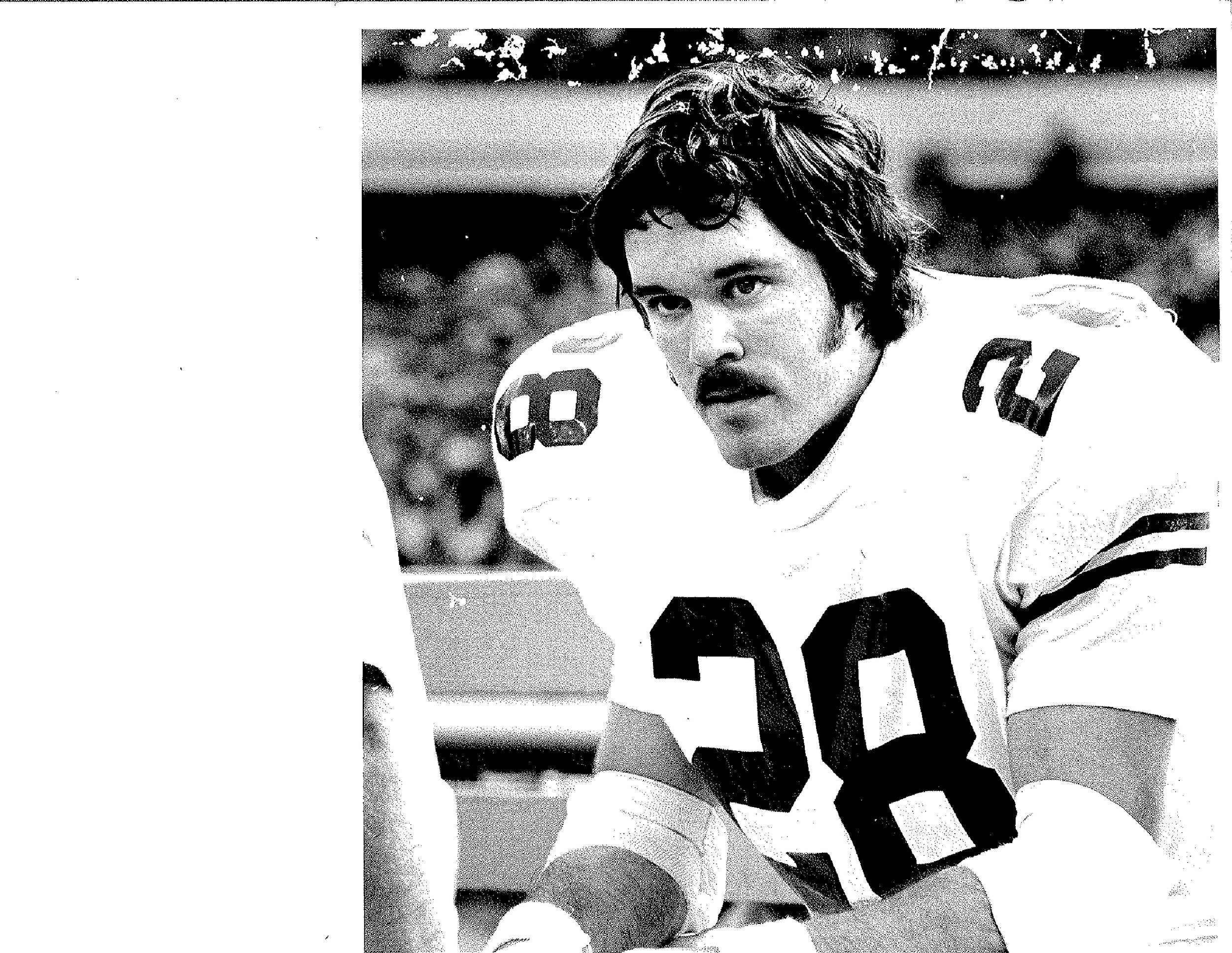
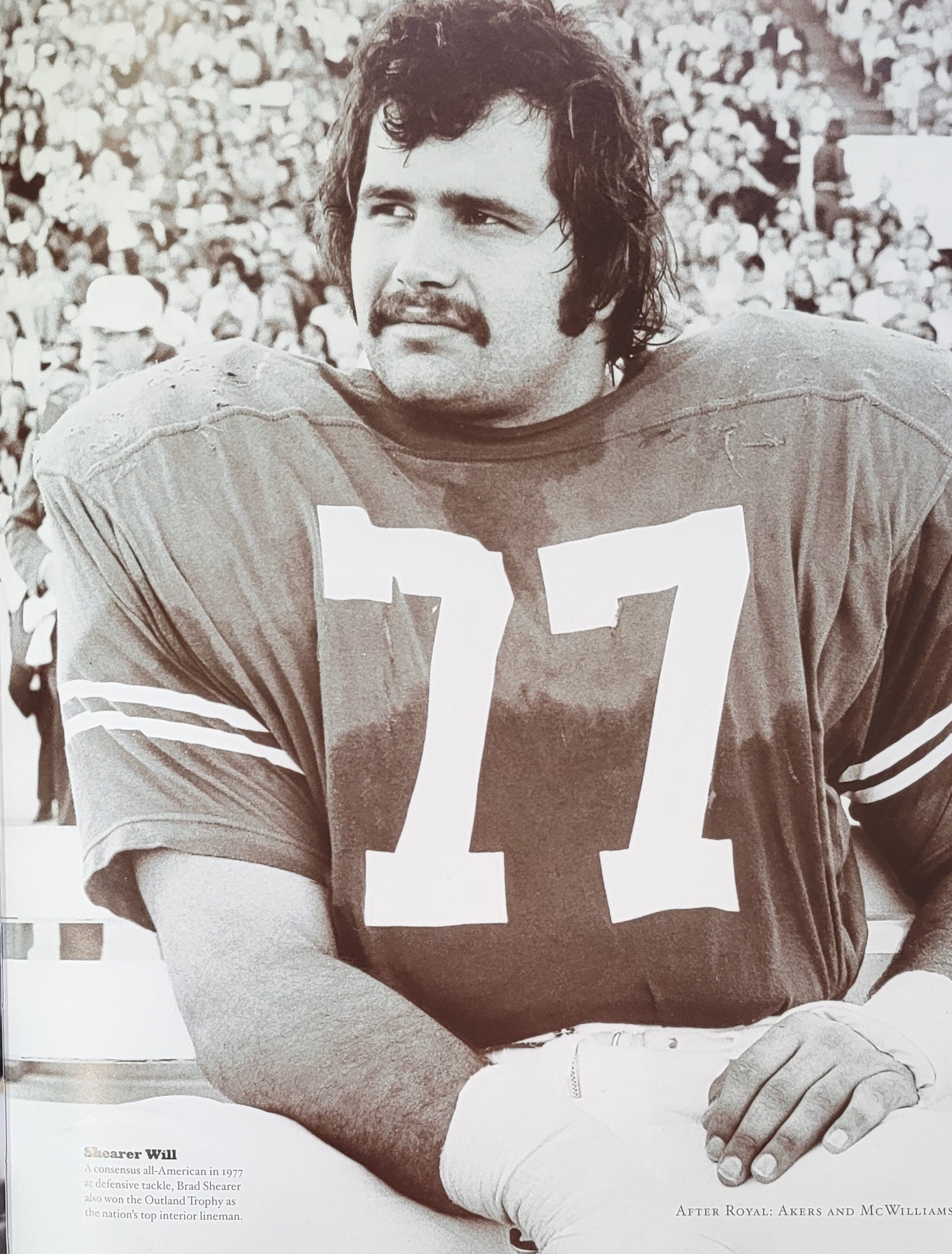
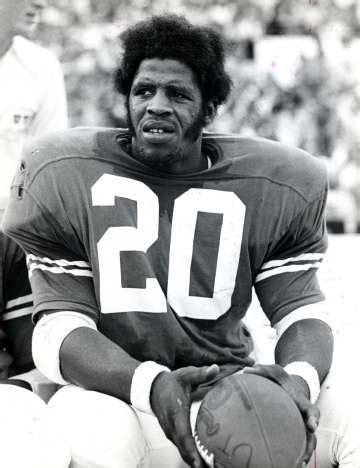
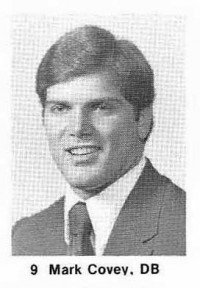
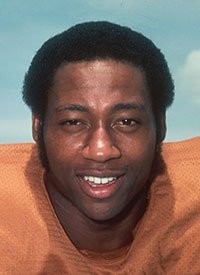
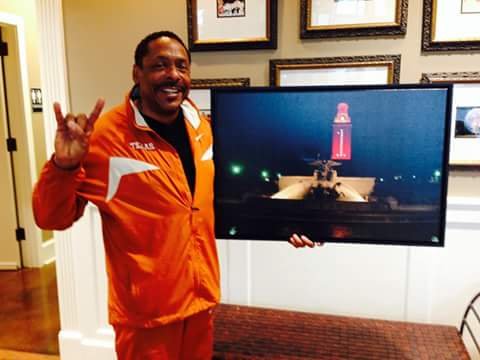
TLSN: What would you say to back-up quarterbacks, particularly in this day of rapid exits into the transfer portal
Frank Medina with Scott Appleton
RANDY: The same thing we told Hays when he was at OU, being back-up to two Heisman Trophy winners….This is a marathon, not a sprint. You must be happy where you are, and I’m not talking about playing time. If you’re moving because of lack of playing time, I don’t believe in that. You stick it out and hope to be able to contribute, but when you commit to a school, you commit to your team. When I wasn’t seeing playing time, my dad wanted me to transfer, but I knew I was playing with the best in the country, against the best in the country. I’d made lasting friendships, and you simply couldn’t beat the education I was getting.
When I get together with former teammates, no one talks about or cares how many minutes we played. We laugh about funny moments at practice, imitate (legendary trainer) Frank Medina, just enjoy sharing memories. link to Frank is https://texas-lsn.squarespace.com/frank-medina-1
TLSN: You've been very successful in setting up an investment company and working for many years in the financial arena. Corny as it might sound, how much did a competitive nature help in your career? And do you still get double takes, recognition, and handshakes when people hear your name upon meeting you?
RANDY: That competition, leadership experience, meant everything. It prepared me for getting up every morning, doing the best I can, competing for that deal, making a good living for my family. That’s what athletics does for people, all those values you learn help you down the road, in business, in committing to your family. It prepared me for being told “no", being slapped down; you go back at it the next day. That’s why we wanted our children to be involved in athletics…you learn it ain’t all about me.
Yes, I do still get recognized. Sometimes people ask, “Didn’t your big brother play at Texas?” I’ll say, “No, that was me.” “No, this was a big guy who played quarterback.” I have to show them my T ring to prove it really was me. But, seriously, it is gratifying when people remember or want to talk about that OU game.
Jenna McEachern
TLSN: Forty-five years after your first heroics as a Longhorn, on the surface at least, it's been a storybook life made for novels and movies. You won the hearts of Texas fans while winning big games with your teammates, you married the Texas cheerleader, you and Jenna have three kids...you've been a success in business and were inducted into the Longhorn Hall of Honor. What's next? What are you looking forward to as a guy who is actually now of retirement age?
RANDY: Grandchildren. Travel with my family. A long life with my wife, kids and buddies. Finally concentrating on my art, continuing dabbling in investments, exploring my artistic side. Design and build a home for Jenna and me and those future grandchildren. I think I want to learn to weld or learn how to be a silversmith. Continue studying God’s word and listening for God’s will.
TLSN: Have fun with this one. It's a question I often close these interviews with. What's something unusual or offbeat or unexpected that most people would not know about the private Randy McEachern?
RANDY: Well, I have had an encounter with then-Prince Charles at Buckingham Palace, a couple of years ago.
But I have artistic talent, I’ve sculpted, done a little drawing and watercolor. And...I'm an ordained minister.
Don’t ask Jenna about offbeat things for the private Randy. I may not like the answer!
TLSN: Sounds like we're gonna need a second interview on all this. Thanks a million, Randy. And Jenna.


